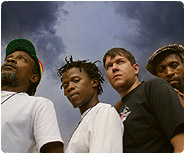|
|
 |
 One Love, Six Languages:
One Love, Six Languages:
Tidal Waves Bring Reggae Vibes from South Africa to SXSW, March 2011
Old-school Zulu guitar pop or distortion-happy punk, lyrical piano or a dubbed-out vuvuzela—it’s all reggae to South Africa’s Tidal Waves. And reggae has become thoroughly African.
Riding the new irie crest, Tidal Waves bring their distinctive call for One Love to the U.S. for a March tour, including a SXSW showcase (March 19; Flamingo Cantina). On stage or on their albums, Tidal Waves pour out snaking bass grooves, bouncing beats, soulful keys, and uplifting multilingual lyrics with an integrated finesse that feels effortless. It flows from where the band comes from: a diverse nation where speaking four languages daily is nothing special. The band doesn’t reflect what the Rainbow Nation is all about; it embodies it.
Singer, multi-instrumentalist, and group founder Jacob “Jakes” Wulana, along with fellow founder and drummer Sam “Drumbo” Shoai, hails from the western dustbowl mining town of Klerksdorp (the rest of the band came together in Johannesburg). Growing up in the township, Wulana and Shoai were surrounded by a range of languages, cultures, musics—Zulu, Xhosa, Setswana, Tshivenda, Afrikaans—as well as by the music of Bob Marley, Sly and Robbie, and Curtis Mayfield.
Each language has musical implications: “If I sing lyrics in Xhosa,” explains Wulana, “I need to have a Xhosa melody and harmony. We grew up singing our traditional songs, with their humming and clapping, that were very different from what we sang at school.”
This culturally rich reality continues to shape the group’s distinctive take on reggae, an approach steeped in South African sensibilities and sounds. Tidal Waves take cues from the music popular in townships midcentury. They turn the Zulu-inspired mbaqanga, with the sparkling guitar licks and rich harmonies made popular worldwide by artists like Miriam Makeba and Mahlathini and the Mahotella Queens, into catchy reggae tracks. “You can’t be a South African and not play mbaqanga,” says Wulana.
Tidal Waves have even made the much maligned vuvuzela part of their reggae. “Most people know the plastic version now, thanks to the World Cup, but the vuvuzela was traditionally made from horn and would blow if something was very important. It has only two notes, low and high, depending on how you blow,” Wulana notes. “Those two notes can go in any key and have a nice effect in dub sections, with the drum and bass.”
The guiding force directing and uniting these many influences is the message, the band’s outspoken cries for justice, fair dealing, and love. “The music that you write as a songwriter has to support the story you say and pull people in,” Wulana reflects. “When we talk about all the wars and warmongering in a song like ‘Bing Bong,’ we can’t use a polite rhythm. It had to be aggressive and show it could handle the message.” “Rapolitiki,” an angry denouncement of politicians and corruption, leaps into a distorted punk-inspired mosh to match the gravelly vocals and urgent lyrics in the Setswana language.
The group also has its softer side and its gentler statements. "Afrika" uses lyrical piano and a slower beat to ask for a return to the traditions of liberty and moral uprightness once treasured across Africa. “We don’t want to press people,” says Wulana. “We’re pleading in front of the nation and need to be respectful.”
In romantic R&B-style ballads (“4ling in Love”) or good old reggae rockers (“Nuff is Enough”), Tidal Waves’ intuitive blend of cultures and sounds, points to the new vibrancy of African reggae. It’s a scene gaining international clout and recognition: Tidal Waves have played shows across southern Africa, New Zealand, China, and Europe. They’ve backed Ziggy Marley at a Soweto concert and toured with the Easy Star All-Stars.
Reggae, thanks to the inspiration African musicians have gained from Bob Marley's sound and attitude, has become a thoroughly African genre. Tidal Waves, with their relentless commitment to touring and their high-energy shows, have played a role opening minds to reggae’s vibe and potential. “At one point, reggae treated like foreign music in Africa, like something from a different culture,” recounts Wulana. “Then we reggae musicians showed we had our own identity, our own sound that says we are the people from the south. People understood that reggae is really about the message at the end of the day.”
|
|
 |
|
|
|